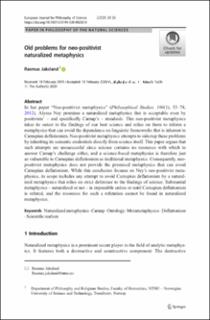| dc.contributor.author | Jaksland, Rasmus | |
| dc.date.accessioned | 2021-01-11T10:03:21Z | |
| dc.date.available | 2021-01-11T10:03:21Z | |
| dc.date.created | 2021-01-06T10:40:55Z | |
| dc.date.issued | 2020 | |
| dc.identifier.citation | European Journal for Philosophy of Science. 2020, 10 . | en_US |
| dc.identifier.issn | 1879-4912 | |
| dc.identifier.uri | https://hdl.handle.net/11250/2722317 | |
| dc.description.abstract | In her paper “Neo-positivist metaphysics” (Philosophical Studies, 160(1), 53–78, 2012), Alyssa Ney promises a naturalized metaphysics that is acceptable even by positivists’ – and specifically Carnap’s – standards. This neo-positivist metaphysics takes its outset in the findings of our best science and relies on them to inform a metaphysics that can avoid the dependence on linguistic frameworks that is inherent to Carnapian deflationism. Neo-positivist metaphysics attempts to sidestep these problems by inheriting its semantic credentials directly from science itself. This paper argues that such attempts are unsuccessful since science contains no resources with which to answer Carnap’s challenge either, and a science-based metaphysics is therefore just as vulnerable to Carnapian deflationism as traditional metaphysics. Consequently, neo-positivist metaphysics does not provide the promised metaphysics that can avoid Carnapian deflationism. While this conclusion focuses on Ney’s neo-positivist metaphysics, its scope includes any attempt to avoid Carnapian deflationism by a naturalized metaphysics that relies on strict deference to the findings of science. Substantial metaphysics – naturalized or not – is impossible unless or until Carnapian deflationism is refuted, and the resources for such a refutation cannot be found in naturalized metaphysics. | en_US |
| dc.language.iso | eng | en_US |
| dc.publisher | Springer | en_US |
| dc.rights | Navngivelse 4.0 Internasjonal | * |
| dc.rights.uri | http://creativecommons.org/licenses/by/4.0/deed.no | * |
| dc.title | Old problems for neo-positivist naturalized metaphysics | en_US |
| dc.type | Peer reviewed | en_US |
| dc.type | Journal article | en_US |
| dc.description.version | publishedVersion | en_US |
| dc.source.pagenumber | 19 | en_US |
| dc.source.volume | 10 | en_US |
| dc.source.journal | European Journal for Philosophy of Science | en_US |
| dc.identifier.doi | 10.1007/s13194-020-00282-0 | |
| dc.identifier.cristin | 1866138 | |
| dc.description.localcode | (C) The Author(s) 2020. Open Access This article is licensed under a Creative Commons Attribution 4.0 | en_US |
| cristin.ispublished | true | |
| cristin.fulltext | original | |
| cristin.qualitycode | 2 | |

